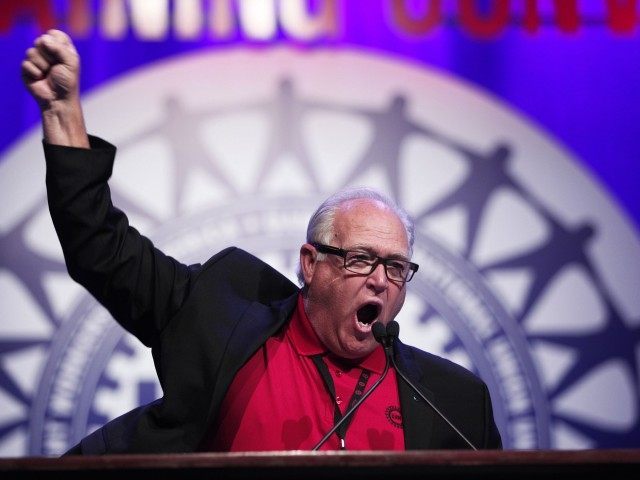With the strike ban that was a pre-condition of the GM and Fiat Chrysler federal bailouts expiring, United Auto Workers (UAW) locals are collecting food and encouraging union members to save for a potential strike when the Big Three four-year labor agreement expires on September 14.
After a decade of concessions, the unions want to restore everything they lost.
As the U.S. auto industry has imploded over several decades due to labor costs and foreign competition, UAW membership plunged by 80 percent, from over 1.5 million in 1979 to less than 300,000 in 2009. Individual union members lucky enough to stay employed were forced to participate in “give backs” valued at between $7,000 and $30,000 over the last decade.
The UAW agreed in 2005 to begin paying higher premiums and higher co-payments for health care; agreed in 2007 to a set up a second-tier wage for entry-level workers starting at $14 an hour, after a strike by 73,000 GM workers; and agreed in 2009 to end automatic bonuses and cost-of-living increases as GM and Chrysler filed for bankruptcy.
As condition of government-sponsored bankruptcy bailouts that cost the U.S. taxpayers $11.2 billion for GM and $1.3 billion for Chrysler, the UAW signed contracts in 2011 that barred the union from striking against the companies for 4 years, starting in September 2011.
The Employment Policy Institute (EPI) described the union “as transitioning from threatening “to withhold labor to one that primarily enables work.” The EPI adds that the U.S. auto industry has revitalized in recent years “through a commitment to quality, innovative production and management techniques, a constructive relationship between management and labor.” The union, for example, agreed to adopt Six Sigma knowledge-driven work-rule flexibility “to discussions of quality, safety, predictive and preventative maintenance, workforce development, team-based operations, and other such topics.”
But with U.S. auto sales hitting a 14-year high of over 17 million mark and American manufacturers reporting $73 billion in profits over the four year contract, the Big Three manufacturers have been giving profit-sharing bonuses to UAW members averaging $7,500 per year. They also plan to build new plants and add thousands of UAW jobs.
In a gesture suggesting something other than a “constructive relationship between management and labor,” UAW local union leadership is demanding an end to the split-wage compensation structure in domestic assembly plants, which pays veteran workers $28 an hour while those hired after the 2009 Great Financial Crisis earn only $19 an hour.
Despite the UAW being one of the leading proponents of Obamacare, the union leadership is also desperate to try to dump the 40 percent excise tax for so-called high-benefit plans, also known as “Cadillac plans,” which takes effect in 2018 from auto workers onto the manufacturers.
According to the Wall Street Journal, UAW Local 276 President Johnny Pruitte notified GM workers last month at an SUV plant in Arlington, Texas, that “We are asking everyone to start putting money aside in case a strike is called.”
The Journal also reported that Scott Houldieson, vice president of UAW Local 551 at Ford’s Chicago plant, said his members have held four strike-preparedness meetings so far this year, reflecting a practice at other locals. Local 551 members are handing out buttons that say, “I’m saving to strike for a better contract.”
The UAW website claims that the union’s “Strike and Defense Fund,” which pays striking workers $200 per week in strike benefits along with health care coverage and life insurance, “strengthens the union’s bargaining position by sending a clear message to employers that they can’t starve UAW members into surrender.”
But a UAW member’s “SDF” will not go very far, considering that the Center for Automotive Research has calculated that GM paid $58 per worker per hour last year, including wages, profit-sharing bonuses and benefits.
Facing the threat of a coming strike, the American auto plants will be running flat-out this summer as the Big Three stockpile inventories of hot-selling light trucks and sport-utility vehicles ahead of the contract expiration and potential strike in mid-September.

COMMENTS
Please let us know if you're having issues with commenting.